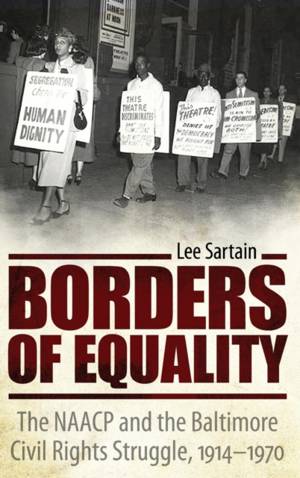
- Retrait gratuit dans votre magasin Club
- 7.000.000 titres dans notre catalogue
- Payer en toute sécurité
- Toujours un magasin près de chez vous
- Retrait gratuit dans votre magasin Club
- 7.000.0000 titres dans notre catalogue
- Payer en toute sécurité
- Toujours un magasin près de chez vous
93,45 €
+ 186 points
Description
A study of the Baltimore NAACP, its vanguard efforts, and its longtime president, Lillie M. Jackson As a border city Baltimore made an ideal arena to push for change during the civil rights movement. It was a city in which all forms of segregation and racism appeared vulnerable to attack by the National Association for the Advancement of Colored People's methods. If successful in Baltimore, the rest of the nation might follow with progressive and integrationist reforms. The Baltimore branch of the NAACP was one of the first chapters in the nation and was the largest branch in the nation by 1946. The branch undertook various forms of civil rights activity from 1914 through the 1940s that later were mainstays of the 1960s movement. Nonviolent protest, youth activism, economic boycotts, marches on state capitols, campaigns for voter registration, and pursuit of antilynching cases all had test runs. Remarkably, Baltimore's NAACP had the same branch president for thirty-five years starting in 1935, Lillie M. Jackson. Her work highlights gender issues and the social and political transitions among the changing civil rights groups. In Borders of Equality, Lee Sartain evaluates her leadership amid challenges from radicalized youth groups and the Black Power Movement. Baltimore was an urban industrial center that shared many characteristics with the North, and African Americans could vote there. The city absorbed a large number of black economic migrants from the South, and it exhibited racial patterns that made it more familiar to Southerners. It was one of the first places to begin desegregating its schools in September 1954 after the Brown decision, and one of the first to indicate to the nation that race was not simply a problem for the Deep South. Baltimore's history and geography make it a perfect case study to examine the NAACP and various phases of the civil rights struggle in the twentieth century. Lee Sartain, Portsmouth, Hampshire, United Kingdom, is a senior lecturer in American studies at the University of Portsmouth. He is the coeditor of Long Is the Way and Hard: One Hundred Years of the National Association for the Advancement of Colored People and the author of Invisible Activists: Women in the Louisiana NAACP and the Struggle for Civil Rights, 1915-1945.
Spécifications
Parties prenantes
- Auteur(s) :
- Editeur:
Contenu
- Nombre de pages :
- 240
- Langue:
- Anglais
- Collection :
Caractéristiques
- EAN:
- 9781617037511
- Date de parution :
- 07-02-13
- Format:
- Livre relié
- Format numérique:
- Genaaid
- Dimensions :
- 152 mm x 229 mm
- Poids :
- 526 g

Les avis
Nous publions uniquement les avis qui respectent les conditions requises. Consultez nos conditions pour les avis.






